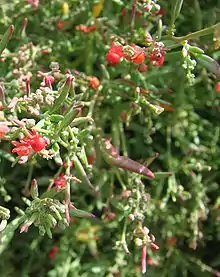Chenopodium nutans
Chenopodium nutans[1] (Syn Einadia nutans, Rhagodia nutans), known by its common name of climbing saltbush or nodding saltbush, is a climbing groundcover native to Australia.
| Chenopodium nutans | |
|---|---|
 | |
| Scientific classification | |
| Kingdom: | Plantae |
| Clade: | Tracheophytes |
| Clade: | Angiosperms |
| Clade: | Eudicots |
| Order: | Caryophyllales |
| Family: | Amaranthaceae |
| Genus: | Chenopodium |
| Species: | C. nutans |
| Binomial name | |
| Chenopodium nutans | |
| Synonyms[1] | |
| |
Plants form a blanket on the surface, climbing over logs and up trees to a height of around 1 metre. Each plant grows to around one metre in diameter. The small leaves are semi-succulent, and have a distinctive arrowhead shape. They grow along long, vine-like branches spreading out form the centre of the plant. Both the leaves and the branches are of a light green colour.[2]
Flowers are inconspicuous green balls, which form on top of terminal spikes during summer. These transform into very conspicuous, tiny, bright-red berries during early autumn.
Human uses
The plant was boiled along with other species of saltbush for use as a greens substitute by early European settlers in the Adelaide region.[3] The plant is easily propagated, making it a particularly attractive and useful plant for revegetation projects. It has recently been enjoying increasing popularity as a garden plant, for its low maintenance, low water usage properties.[4]
References
- Susy Fuentes-Bazan, Guilhem Mansion, Thomas Borsch: Towards a species level tree of the globally diverse genus Chenopodium (Chenopodiaceae). In: Molecular Phylogenetics and Evolution. Vol. 62, No. 1, 2012, ISSN 1055-7903, p. 372, DOI:10.1016/j.ympev.2011.10.006
- "Plants of the Adelaide plains and hills". Library of South Australia. Retrieved 21 March 2011.
- "The Native Plants of Adelaide". Department for Environment and Heritage. Archived from the original on 15 March 2011. Retrieved 21 March 2011.
- "LOCAL PLANTS CONSERVED IN A MUNICIPAL GARDEN" (PDF). Burnside City Council. Archived from the original (PDF) on 23 April 2011. Retrieved 18 April 2011.